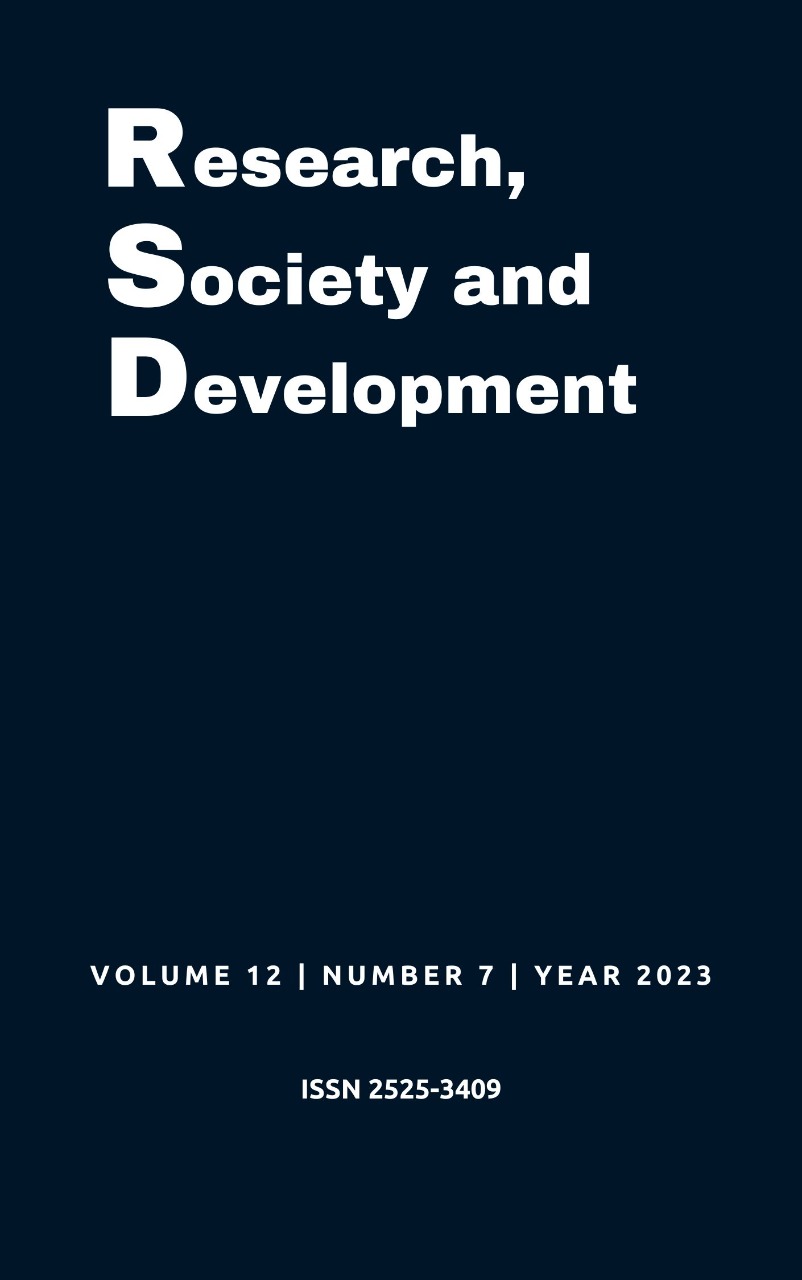Sistema de apoio à decisão integrando cadastro negativo, scoring, análise qualitativa de crédito com inteligência artificial e criação de contratos: Protocolo para revisão de escopo
DOI:
https://doi.org/10.33448/rsd-v12i7.42680Keywords:
Credit analysis; Negative registration; Software; Information system; Artificial intelligence; Scope revision.Abstract
According to the scope review protocol presented in this article, credit is defined as the combination of trust and time, but it also brings risks of default. Companies that offer credit add value to customers, and studies show that private credit has a positive impact on economic growth. However, there are problems of information asymmetry, adverse selection, and moral hazard in the lender-borrower relationship. The objective of this scope review will be to map credit decision support systems for non-financial companies that use negative registry, credit scoring, qualitative analysis with artificial intelligence, and automatic contract generation, precisely to determine if there are solutions of intelligent and adaptable software systems that solve or minimize the problems identified here. The review protocol was developed following the items of the PRISMA Extension for Scoping Reviews (PRISMA-ScR): Checklist and Explanation, and the protocol registration was carried out on the Open Science Framework, which contributes to reliable and reproducible scientific practice. The research will be conducted on relevant databases, with defined eligibility criteria, and the selected studies will be analyzed, and the data will be synthesized in a table to provide a comprehensive overview of existing credit decision support systems.
References
Almeida, V. L. D. De. (2019). O efeito do crédito privado sobre o crescimento econômico: uma análise por meio de variáveis instrumentais. https://repositorio.insper.edu.br/handle/11224/2583
Arksey, H., & O’Malley, L. (2005). Scoping studies: towards a methodological framework. International Journal of Social Research Methodology, 8(1), 19–32. https://doi.org/10.1080/1364557032000119616
Barros, S. R. R., Medeiros, G. P., & Miranda, M. D. de A. (2019). Software para Análise de Concessão de Crédito Usando Redes Neurais Artificiais. Anais do Encontro Virtual de Documentação em Software Livre e Congresso Internacional de Linguagem e Tecnologia Online, 7(1). http://www.periodicos.letras.ufmg.br/index.php/anais_linguagem_tecnologia/article/view/15080
dos Santos Marloch, V. (2022). A sistematização das informações no auxílio do processo de tomada de decisão na análise de crédito. https://repositorio.ufsc.br/handle/123456789/234878
Foster, E. D., & Deardorff, A. (2017). Open Science Framework (OSF). Journal of the Medical Library Association, 105(2). https://doi.org/10.5195/jmla.2017.88
Grau Álvarez, J., & Portela González, J. (2020). Machine Learning y riesgo de crédito. https://repositorio.comillas.edu/xmlui/handle/11531/39062
Herce, J. A., & Hernández, P. (2014). Morosidad y financiación empresarial: el papel de la financiación no bancaria en España. http://www.cepyme.es/es/documentos/boletin-de-morosidad-y-financiacion-empresarial_23.html
Martinho, R., & Antunes, A. (2012). Um modelo de scoring para as empresas portuguesas.
Martin-Marin, J., Medina, R., & Trujillo-Ponce, A. (2007). Un análisis de los modelos contables y de mercado en la evaluación del riesgo de crédito: una aplicación al mercado brusátil español. Revista europea de dirección y economía de la empresa, 16(2), 93-110.
Munn, Z., Peters, M. D. J., Stern, C., Tufanaru, C., McArthur, A., & Aromataris, E. (2018). Systematic review or scoping review? Guidance for authors when choosing between a systematic or scoping review approach. BMC Medical Research Methodology, 18(1). https://doi.org/10.1186/s12874-018-0611-x
Ortega Moreno, P. (2014). Sistema web de cálculo de calificaciones de crédito de empresas. https://repositorio.uam.es/handle/10486/660521
Pansonato, F. (2016). Avaliação do impacto da lei de aviso recebimento sobre o mercado de crédito. https://doi.org/10.272/15
Pereira, V. M. M. (2009). Selecção adversa na concessão de crédito a particulares em Portugal. https://repositorio.iscte-iul.pt/handle/10071/1724
Peters, M. D. J., Godfrey, C. M., Khalil, H., McInerney, P., Parker, D., & Soares, C. B. (2015). Guidance for conducting systematic scoping reviews. International Journal of Evidence-Based Healthcare, 13(3), 141–146. https://doi.org/10.1097/XEB.0000000000000050
Peters, M. D. J., Marnie, C., Tricco, A. C., Pollock, D., Munn, Z., Alexander, L., McInerney, P., Godfrey, C. M., & Khalil, H. (2020). Updated methodological guidance for the conduct of scoping reviews. JBI Evidence Synthesis, 18(10), 2119–2126. https://doi.org/10.11124/JBIES-20-00167
Reis, V. M. S. dos. (2012). Ensaios sobre seleção adversa e risco moral no mercado de crédito. http://bibliotecadigital.fgv.br:80/dspace/handle/10438/10137
Santos, J. O. dos. (2009). Análise de Crédito (3a ed.). Editora Atlas.
Santos, & dos, M. M. (2010). Análise de crédito para micro e pequenas empresas a partir do CREDIT SCORING: elaborada por uma cooperativa de crédito do sistema SICREDI. http://www.repositorio.jesuita.org.br/handle/UNISINOS/5899
Smolski, F., & Ruffoni, J. (2021, Agosto 12). A relação entre crédito e inovação: uma revisão sistemática da literatura empírica. Conference: I Encontro Nacional de Jovens Pesquisadores (ENJP). https://www.researchgate.net/publication/358228296_A_relacao_entre_credito_e_inovacao_uma_revisao_sistematica_da_literatura_empirica
Tricco, A. C., Lillie, E., Zarin, W., O’Brien, K. K., Colquhoun, H., Levac, D., Moher, D., Peters, M. D. J., Horsley, T., Weeks, L., Hempel, S., Akl, E. A., Chang, C., McGowan, J., Stewart, L., Hartling, L., Aldcroft, A., Wilson, M. G., Garritty, C., & Straus, S. E. (2018). PRISMA Extension for Scoping Reviews (PRISMA-ScR): Checklist and Explanation. Annals of Internal Medicine, 169(7), 467–473. https://doi.org/10.7326/M18-0850
Wanzeller, W. F., Cruz, M. E., Carvalho, M. F., & Da Cruz, A. M. R. (2021). Nice Payer-A software platform for registering Debtors with Past Due Debts. Iberian Conference on Information Systems and Technologies, CISTI. https://doi.org/10.23919/CISTI52073.2021.9476227
Downloads
Published
How to Cite
Issue
Section
License
Copyright (c) 2023 Wenderson Ferreira Wanzeller; Carlos Manuel Oliveira Alves; Manuel Pérez Cota

This work is licensed under a Creative Commons Attribution 4.0 International License.
Authors who publish with this journal agree to the following terms:
1) Authors retain copyright and grant the journal right of first publication with the work simultaneously licensed under a Creative Commons Attribution License that allows others to share the work with an acknowledgement of the work's authorship and initial publication in this journal.
2) Authors are able to enter into separate, additional contractual arrangements for the non-exclusive distribution of the journal's published version of the work (e.g., post it to an institutional repository or publish it in a book), with an acknowledgement of its initial publication in this journal.
3) Authors are permitted and encouraged to post their work online (e.g., in institutional repositories or on their website) prior to and during the submission process, as it can lead to productive exchanges, as well as earlier and greater citation of published work.

